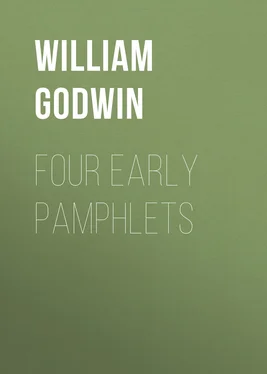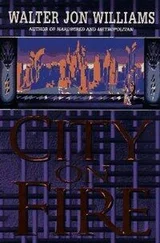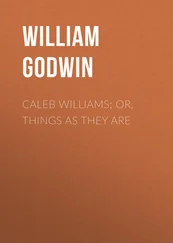William Godwin - Four Early Pamphlets
Здесь есть возможность читать онлайн «William Godwin - Four Early Pamphlets» — ознакомительный отрывок электронной книги совершенно бесплатно, а после прочтения отрывка купить полную версию. В некоторых случаях можно слушать аудио, скачать через торрент в формате fb2 и присутствует краткое содержание. Жанр: foreign_prose, Европейская старинная литература, на английском языке. Описание произведения, (предисловие) а так же отзывы посетителей доступны на портале библиотеки ЛибКат.
- Название:Four Early Pamphlets
- Автор:
- Жанр:
- Год:неизвестен
- ISBN:нет данных
- Рейтинг книги:4 / 5. Голосов: 1
-
Избранное:Добавить в избранное
- Отзывы:
-
Ваша оценка:
- 80
- 1
- 2
- 3
- 4
- 5
Four Early Pamphlets: краткое содержание, описание и аннотация
Предлагаем к чтению аннотацию, описание, краткое содержание или предисловие (зависит от того, что написал сам автор книги «Four Early Pamphlets»). Если вы не нашли необходимую информацию о книге — напишите в комментариях, мы постараемся отыскать её.
Four Early Pamphlets — читать онлайн ознакомительный отрывок
Ниже представлен текст книги, разбитый по страницам. Система сохранения места последней прочитанной страницы, позволяет с удобством читать онлайн бесплатно книгу «Four Early Pamphlets», без необходимости каждый раз заново искать на чём Вы остановились. Поставьте закладку, и сможете в любой момент перейти на страницу, на которой закончили чтение.
Интервал:
Закладка:
NEW BOOKS,
Printed for J. STOCKDALE, opposite Burlington-House, Piccadilly.
STOCKDALE's NEW COMPANION to the LONDON KALENDAR, and COURT and CITY REGISTER, for the Year 1783; being a List of all the CHANGES in ADMINISTRATION, from the Accession of the present King, in October 1760, to the present Time. To which is perfixed, a List of the late and present HOUSE of COMMONS, shewing the Changes made in the Members of Parliament by the General Election in September 1780, with the Names of the Candidates where the Elections were contested, the Numbers polled, and the Decisions since made by the Select Committees. Also the Dates when each City and Borough first sent Representatives to Parliament, the Right of Election in each Place, and the supposed Number of Voters. To which is added, a complete INDEX of NAMES. Price 1s.
The LONDON KALENDAR, or COURT and CITY REGISTER, for 1783; including all the new Peers lately created; new Members; Alterations in all the different Departments under Government, in Great-Britain, Ireland, and America; with a complete List of the Sovereigns of Europe; the Presidents of the Congress, from 1774; Presidents and Governors of the American States; and a number of other new lists not to be found in any other Publication. Containing complete Lists of British and Irish Houses of Parliament; Establishments of England, Scotland, Ireland, America, &c. correct Lists of the Peeresses, Baronets, Universities, Seminaries, Hospitals, Charities, Governors, Public-offices; Army, Navy, Collectors at the different Ports, &c.
This London Kalendar is upon a Plan much more extensive and useful than any other Book of the Kind yet published. Price 2s.
==>Be careful to ask for The London Kalendar , printed for J. Stockdale, &c. which may be had bound in the three following different Ways.
I. With the New Companion to the London Kalendar.
II. With the Arms of all the Peers of England, Scotland, and Ireland.
III. With Rider's Sheet Almanack or Book Almanack.
A DIALOGUE on the ACTUAL STATE of PARLIAMENT. Price 1s.
The Propriety of Retaining GIBRALTAR impartially considered. Price 1s.
An ATTEMPT to balance the INCOME and EXPENDITURE of the STATE: With some Reflections on the Nature and Tendency of the late Political Struggles for Power. By JOHN EARL of STAIR. Second Edition. Price 1s.
THOUGHTS on a REFORM in the Representation of the People in the Commons House of Parliament. Addressed to the Hon. WILLIAM PITT. Price 1s. 6d.
Inscribed to the SOCIETY for promoting CONSTITUTIONAL INFORMATION.
The NATURE and EXTENT of SUPREME POWER, in a Letter to the Rev. DAVID WILLIAMS, (Author of Letters on Political Liberty) shewing the ultimate end of Human Power, and a free Government, under God; and in which Mr. Locke's Theory of Government is examined and explained, contrary to the general construction of that great Writer's particular sentiments on the Supremacy of the People. By M. DAWES, Esq. Price 1s.
INSTRUCTIONS TO A STATESMAN. HUMBLY INSCRIBED TO THE RIGHT HONOURABLE GEORGE EARL TEMPLE
MY LORD,
The following papers fell into my hands by one of those unaccountable accidents, so frequent in human life, but which in the relation appear almost incredible. I will not however trouble your lordship with the story. If they be worthy of the press, it is of no great consequence to the public how they found their way thither. If they afford your lordship a moment's amusement, amidst the weightier cares incident to your rank and fortune, I have obtained my end.
I have endeavoured in vain to investigate who was their author, and to whom they were addressed. It should seem, from the internal evidence of the composition, that they were written by a person, who was originally of a low rank or a menial station, but who was distinguished by his lord for those abilities and talents, he imagined he discovered in him. I have learned, by a kind of vague tradition, upon which I can place little dependence, that the noble pupil was the owner of a magnificent château not a hundred miles from your lordship's admired seat in the county of Buckingham. It is said that this nobleman, amidst a thousand curiosities with which his gardens abounded, had the unaccountable whim of placing a kind of artificial hermit in one of its wildest and most solitary recesses. This hermit it seems was celebrated through the whole neighbourhood, for his ingenuity in the carving of tobacco-stoppers, and a variety of other accomplishments. Some of the peasants even mistook him for a conjuror. If I might be allowed in the conjectural licence of an editor, I should be inclined to ascribe the following composition to this celebrated and ingenious solitaire.
Since however this valuable tract remains without an owner, I thought it could not be so properly addressed to any man as your lordship. I would not however be misunderstood. I do not imagine that the claim this performance has upon the public attention, consists in the value and excellence of it's precepts. On the contrary, I consider it as the darkest and most tremendous scheme for the establishment of despotism that ever was contrived. If the public enter into my sentiments upon the subject, they will consider it as effectually superseding Machiavel's celebrated treatise of The Prince, and exhibiting a more deep-laid and desperate system of tyranny. For my part, I esteem these great and destructive vices of so odious a nature, that they need only be exposed to the general view in order to the being scouted by all. And if, which indeed I cannot possibly believe, there has been any noble lord in this kingdom mean enough to have studied under such a preceptor, I would willingly shame him out of his principles, and hold up to him a glass, which shall convince him how worthy he is of universal contempt and abhorrence.
The true reason, my lord, for which I have presumed to prefix your name to these sheets is, that the contrast between the precepts they contain, and the ingenuous and manly character that is universally attributed to your lordship, may place them more strongly in the light they deserve. And yet I doubt not there will be some readers perverse enough to imagine that you are the true object of the composition. They will find out some of those ingenious coincidences, by which The Rape of the Lock, was converted into a political poem, and the Telemaque of the amiable Fenelon into a satire against the government under which he lived. I might easily appeal, against these treacherous commentators, to the knowledge of all men reflecting every corner of your lordship's gardens at Stowe. I might boldly defy any man to say, that they now contain, or ever did contain, one of these artificial hermits. But I will take up your lordship's defence upon a broader footing. I will demonstrate how contrary the character of your ancestors and your own have always been to the spirit and temper here inculcated. If this runs me a little into the beaten style of dedication, even the modesty of your lordship will excuse me, when I have so valuable a reason for adopting it.
I shall confine myself, my lord, in the few thoughts I mean to suggest upon this head, to your two more immediate ancestors, men distinguished above the common rate, by their virtues or their abilities. Richard earl Temple, your lordship's immediate predecessor, as the representative of your illustrious house, will be long remembered by posterity under the very respectable title of the friend of the earl of Chatham. But though his friend, my lord, we well know that he did not implicitly follow the sentiments of a man, who was assuredly the first star in the political hemisphere, and whose talents would have excused, if any thing could have excused, an unsuspecting credulity. The character of lord Chatham was never, but in one instance, tarnished. He did not sufficiently dread the omnipotence of the favourite. He fondly imagined that before a character so brilliant, and success so imposing as his had been, no little system of favouritism could keep its ground. Twice, my lord, he was upon the brink of the precipice, and once he fell. When he trembled on the verge, who was it that held him back? It was Richard earl Temple. Twice he came, like his guardian angel, and snatched him from his fate. Lord Chatham indeed was formed to champ the bit, and spurn indignant at every restraint. He knew the superiority of his abilities, he recollected that he had twice submitted to the honest counsels of his friend, and he disdained to listen any longer to a coolness, that assimilated but ill to the adventurousness of his spirit; and to a hesitation, that wore in his apprehension the guise of timidity. What then did Richard earl Temple do? There he fixed his standard, and there he pitched his tent. Not a step farther would he follow a leader, whom to follow had been the boast of his life. He erected a fortress that might one day prove the safeguard of his misguided and unsuspecting friend.
Читать дальшеИнтервал:
Закладка:
Похожие книги на «Four Early Pamphlets»
Представляем Вашему вниманию похожие книги на «Four Early Pamphlets» списком для выбора. Мы отобрали схожую по названию и смыслу литературу в надежде предоставить читателям больше вариантов отыскать новые, интересные, ещё непрочитанные произведения.
Обсуждение, отзывы о книге «Four Early Pamphlets» и просто собственные мнения читателей. Оставьте ваши комментарии, напишите, что Вы думаете о произведении, его смысле или главных героях. Укажите что конкретно понравилось, а что нет, и почему Вы так считаете.












